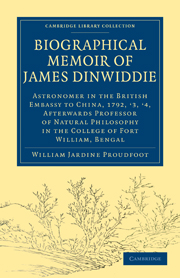 Biographical Memoir of James Dinwiddie, L.L.D., Astronomer in the British Embassy to China, 1792, '3, '4,
Biographical Memoir of James Dinwiddie, L.L.D., Astronomer in the British Embassy to China, 1792, '3, '4, Published online by Cambridge University Press: 05 October 2010
Immediately on landing Dr. Dinwiddie delivered the despatches, and on the 30th, at the levee, was introduced to Sir John Shore, the Governor-General, who was particularly curious about the Chinese mission. For this purpose the Doctor was invited to dine with His Excellency on the following day; it also afforded an opportunity of talking over the state of business in India. By this time, he had delivered his letters of introduction, and was altogether pleased with his prospects. He was, however, landed in what was considered the most expensive city in the world, and where every exertion he could put forth would be requisite to gain success. His letters proved of great service, and, receiving ample encouragement, he lost no time in preparing, under the patronage of His Excellency, the Governor-General, for a course of lectures in experimental philosophy, which at once established his fame and independence in Bengal. To use his own words:—“My success at Canton enabled me to procure a credit on Calcutta for a small sum sufficient to set matters afloat. I opened a subscription, and in the course of a few weeks had the pleasure of delivering my introductory lecture to a company of one hundred and eighty of the first ladies and gentlemen in the settlement. The subscription was one hundred rupees, which, if remitted to England, at the present rate of exchange, would amount to £2,250. the greatest sum that, probably, ever was received for one course in any part of the world.”
To save this book to your Kindle, first ensure no-reply@cambridge.org is added to your Approved Personal Document E-mail List under your Personal Document Settings on the Manage Your Content and Devices page of your Amazon account. Then enter the ‘name’ part of your Kindle email address below. Find out more about saving to your Kindle.
Note you can select to save to either the @free.kindle.com or @kindle.com variations. ‘@free.kindle.com’ emails are free but can only be saved to your device when it is connected to wi-fi. ‘@kindle.com’ emails can be delivered even when you are not connected to wi-fi, but note that service fees apply.
Find out more about the Kindle Personal Document Service.
To save content items to your account, please confirm that you agree to abide by our usage policies. If this is the first time you use this feature, you will be asked to authorise Cambridge Core to connect with your account. Find out more about saving content to Dropbox.
To save content items to your account, please confirm that you agree to abide by our usage policies. If this is the first time you use this feature, you will be asked to authorise Cambridge Core to connect with your account. Find out more about saving content to Google Drive.